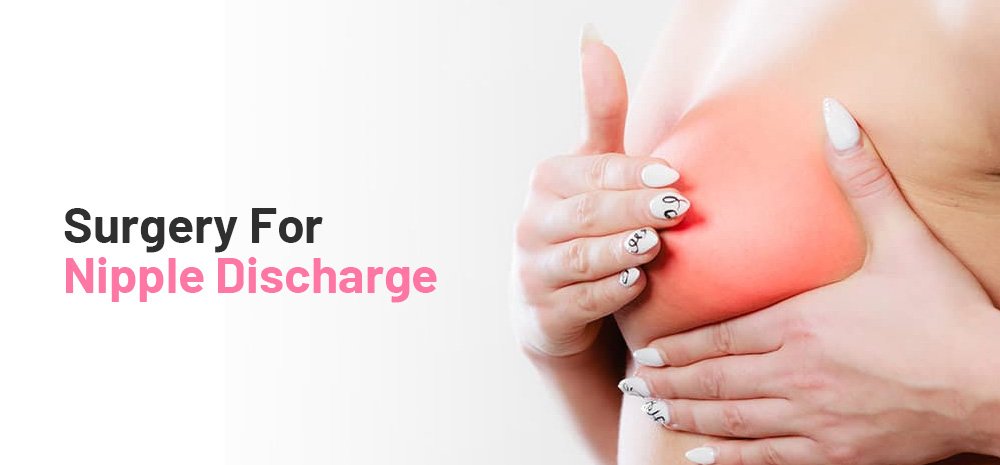
Galactorrhea-Surgery for nipple discharge – Causes, symptoms & treatment
The condition known as galactorrhea causes milk to leak from the breasts. The most prominent symptom of galactorrhea is the occurrence of the condition in individuals who are not breastfeeding or pregnant. Stimulation, medicine, or dysfunction of the pituitary gland can all lead to this condition.
Galactorrhea most often happens to women or people who were assigned female at birth (AFAB), but it can also happen to men or people who were assigned male at birth (AMAB), as well as to children. People who have been pregnant and are between 20 and 35 years old are most likely to have it.
What exactly is Galactorrhea?
Galactorrhea is a condition that occurs when a woman’s breasts produce milk or a milk-like discharge for no apparent reason. It’s possible that your breast will leak this nipple discharge on its own or when it’s touched. It has nothing to do with the production of breast milk during pregnancy or breastfeeding (chestfeeding).
Galactorrhea can be an indicator of a more serious underlying health condition, although in most cases, it is brought on by an excess of prolactin. Milk production can be stimulated by the hormone known as prolactin. The pituitary gland, which is located at the base of the brain, is responsible for producing it.
Causes of nipple discharge
Most people with galactorrhea have a tumour on their pituitary gland that is not cancerous. Too much prolactin is being made by your pituitary gland because of the tumour (hyperprolactinemia). Prolactin is the hormone that helps you make milk after giving birth. When you have too much prolactin, your body thinks it needs to make milk, which is why you leak milk from your nipples.
Some other causes are:
- Taking medicine, like birth control pills, medicine for high blood pressure, or antidepressants.
- Getting your breasts too excited (through sexual activity, clothing or frequent breast self-exams).
- Thyroid disorders.
- Long-term kidney disease.
- Taking herbal supplements like fenugreek or fennel seed.
- using painkillers.
- Your spinal cord is hurt or broken.
What do the symptoms of galactorrhea look like?
When you’re not breastfeeding or pregnant, the main sign of galactorrhea is leaking a light white, milk-like fluid. It usually happens in both breasts and can leak when you squeeze your nipple or on its own.
There may be other signs of galactorrhea, such as:
- Amenorrhea (infrequent or stopped menstrual periods) (infrequent or stopped menstrual periods).
- Vaginal dryness.
- Headache.
- Less desire to have sex.
- You’re getting new hair on your chest or chin.
- Acne.
- Erectile dysfunction.
How is Galactorrhea diagnosed?
It can be hard to figure out what causes galactorrhea because there are so many possible causes. The following testing can be done to know the root cause of nipple discharge:
During a physical exam, your doctor may gently remove some fluid from your nipple by looking at the area around it. Your doctor may also look for breast lumps or other suspicious areas of thickened breast tissue.
Analyzing the fluid that comes out of the nipple to see if there are fat droplets can help confirm that the person has Galactorrhea.
A blood test to determine the amount of prolactin in your body. If your level of prolactin is high, your doctor will likely also check your thyroid-stimulating hormone (TSH) level.
A pregnancy test to rule out pregnancy as a cause of the discharge from the nipple.
Mammography, ultrasound, or both, to get pictures of your breast tissue if your doctor finds a lump in your breast or notices other changes in your breasts or nipples that seem odd. If your blood test shows that your prolactin level is high, an MRI of your brain will be done to look for a tumor or other problem with your pituitary gland.
If your doctor thinks that a medicine you’re taking might be the cause of your galactorrhea, he or she might tell you to stop taking the medicine for a short time so that this possible cause can be checked out.
Treatment of nipple discharge| Galactorrhea
The best way to treat galactorrhea depends on what is causing it. Some people don’t need any treatment because it goes away on its own.
Your doctor may also suggest the following to treat the condition:
- Taking drugs like cabergoline and bromocriptine lowers the amount of prolactin in the body.
- Avoid doing things that give your nipples too much to do.
- Changing or stopping medicines.
- If you have hypothyroidism, you will need to take medicine to treat your underactive thyroid.
- Wearing loose-fitting clothes to cut down on friction on your nipples.
- Putting on breast pads to soak up leaks.
When galactorrhea is caused by a pituitary tumour, the tumour is usually harmless (not cancerous). If the tumour doesn’t cause any other problems, your doctor may decide that you don’t need treatment.
If a pituitary tumour needs to be treated, it is usually done with drugs that make the tumour smaller. In rare cases, a pituitary tumour may need surgery or radiation therapy to be removed or shrunk.
Dr Mansi is the best person to talk to about surgery for breast cancer.
Dr Mansi Chowhan is a well-known surgical oncologist who has worked in his field for more than 12 years. She is an expert in breast oncoplastic surgery, head and neck surgery, and reconstructive surgery, which makes her a very good surgeon
Dr Mansi has been a doctor for more than 12 years and has worked at some of the best hospitals in the Delhi-National Capital Region (NCR), like Fortis Healthcare (Delhi and Gurgaon), Artemis Hospital (Gurgaon), Paras Hospital (Gurgaon), and the Asian Institute of Medical Sciences (Faridabad).
More Expertise
EXCELLENT






